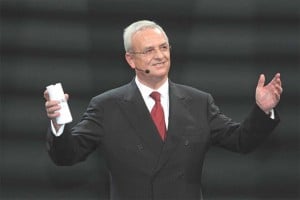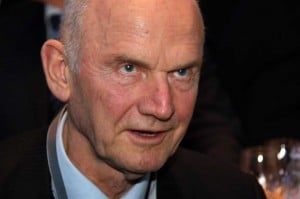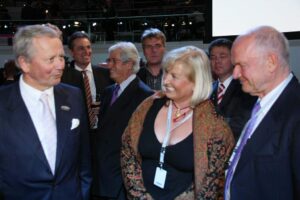Ferdinand Piech, the Porsche family patriarch and imperious former leader of the Volkswagen Group, who set the company on the road to becoming the world’s largest automaker and also created a corporate culture that nearly buried the company in scandal, has died at the age of 82.
The grandson of sports car and VW Beetle pioneer Ferdinand Porsche, died in Rosenheim, Bavaria, his wife said. “My husband … died suddenly and unexpectedly” on August 25, Ursula Piech said, after a life “marked by a passion for cars and the employees who build them.”
Piech, a brilliant engineer in his own right who almost single handedly modernized Volkswagen and Audi’s product, transformed Volkswagen from a struggling carmaker with woeful productivity and spotty quality into a global powerhouse and a leader in automotive design and engineering during his tenure as the company’s chief executive.
(From Mustangs to Minivans, Automotive Icon Lee Iacocca Dead at 94)
He led VW from 1993 to 2002 before becoming head of the supervisory board until 2015, which he ruled with an iron hand, but left amid the “dieselgate” scandal when it was discovered the company had cheated on emission tests.
Piech himself was never implicated in the scandal personally, which has now cost Volkswagen more than $30 billion in fines, recalls, court settlements and other expenses. But dieselgate exposed an internal culture at Volkswagen exacerbated by Piech’s domineering management style in which corporate goals were to be met without any equivocation and at all costs.
However, Piech had turned around VW’s fortunes after betting on a modular construction technique which allowed Audi, Skoda and VW brands to share up to 65% common parts, helping Volkswagen Group to attain greater economies of scale and bolster the company’s productivity.
Under Piech’s leadership, VW emphasized engineering brilliance ahead of profits, and went on an expansion spree, adding high-margin luxury marques Bentley, Bugatti and Lamborghini in a single year.
“First and foremost, I always saw myself as a product person, and relied on gut instinct for market demand. Business and politics never distracted me from the core of our mission: to develop and make attractive cars,” Piech wrote in his autobiography.
But Piech also turned out to be a deft businessman and he succeeded in moving Volkswagen from a loss of 1 billion euros into a 2.6 billion euro profit while spearheading VW’s’ expansion into a 12-brand empire which includes the Seat, Skoda, Bentley, Audi, Porsche and Ducati brands in addition to the MAN and Scania truck brands.
During his tenure, Piech also cemented Volkswagen into a dominant role in the Chinese market, which ultimately helped it surpass Toyota as the world’s leading automaker in 2018. The race for the top spot in 2019 is undecided.
(VW Chairman Piech Unexpectedly Quits After Clash Over Company’s Future)
Early in his career, Piech, who was born in Vienna, had demonstrated he was quite willing to take risks.

Piech left VW in a dispute with his successor Martin Winterkorn, who was ousted amidst dieselgate allegations.
As a 31-year-old head of product development at Porsche in 1968, he invested two thirds of Porsche’s annual racing budget to build 25 Porsche 917 race cars with an untested 600 horsepower air-cooled 12-cylinder engine.
Family members accused Piech of being an irresponsible manager for risking the company’s budget on one project. However, the Porsche 917 went on to become one of the most successful race cars in history, Piech’s reputation as a visionary engineer was made
Throughout the years, Piech introduced the quattro all-wheel drive system at Audi. He also moved the Audi brand upscale by emphasizing aerodynamic design, which was critical in making it a credible rival to Mercedes-Benz and BMW not only in Europe but also the U.S. and China.
Piech also was known for his ruthless management style that included using internal rivalries to his own advantage, even if it meant backing labor leaders to the detriment of his own managers including Bernd Pischetsrieder and Wolfgang Bernhard.
Bernhard, after returning to Mercedes-Benz, would only shake his head when asked to discuss his time at VW.
Unions continue to have a large role in Volkswagen’s internal deliberations and a handful of Piech’s top lieutenants were prosecuted for securing support for radical restructuring plans by sponsoring lavish business trips for labor leaders, including sex with prostitutes.
(VW Denies Seeking Stake in Tesla)
“It is not possible to take a company to the top by focusing on the highest level of harmony,” Piech said in his book.


